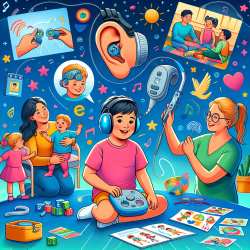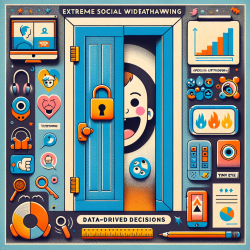Introduction
As a speech-language pathologist deeply invested in data-driven decisions, I am constantly on the lookout for research that can enhance the outcomes for children with intellectual and/or developmental disabilities (IDDs). A recent systematic review by Elliott et al. (2024) sheds light on the experiences and information needs of parents seeking emergency department (ED) care for their children with IDDs. This blog aims to translate these findings into actionable insights for practitioners, encouraging further research and skill enhancement in managing such cases.
Understanding Parents' Experiences
The review identifies four main themes from parents' experiences in the ED:
- Appropriateness of ED: Parents often question whether the ED is the right place for managing their child's behaviors of concern (BOC). The limited role of ED staff in handling these behaviors leads to frustration and anxiety.
- Staff Interaction and Knowledge: Many parents feel judged or criticized due to their child's behavior. They report that ED staff often lack the necessary knowledge and communication skills to effectively manage children with IDDs.
- ED Environment: The sensory-rich environment of the ED can exacerbate anxiety and stress in children with IDDs. Parents express concerns about the impact of such environments on their child’s behavior and future willingness to visit the ED.
- Disclosure of Condition: Parents are often conflicted about disclosing their child's IDD diagnosis, fearing stigma but recognizing the potential for better care if staff are informed.
Implications for Practitioners
Practitioners can leverage these insights to improve their interactions with both children and their parents. Here are some strategies:
- Training and Education: Continuous education on IDDs for ED staff can improve understanding and management of these cases. Practitioners should advocate for training programs that focus on communication strategies and behavioral management techniques.
- Environmental Adjustments: Simple modifications, such as creating sensory-friendly spaces or providing sensory kits, can significantly improve the ED experience for children with IDDs.
- Collaborative Care: Encourage a partnership approach where parents are seen as experts on their child’s needs. This can be achieved by actively listening to parents and incorporating their insights into care plans.
- Clear Communication: Develop clear communication protocols that include explaining ED processes and expected wait times to parents, which can help manage expectations and reduce anxiety.
Encouraging Further Research
The review highlights the need for more research into the specific information needs of parents during ED visits. Understanding these needs can guide the development of resources that empower parents and improve their health literacy. Practitioners are encouraged to engage in research that explores these areas, contributing to a body of knowledge that can inform policy and practice improvements.
Conclusion
By integrating the findings from Elliott et al.'s systematic review into practice, we can enhance the ED experience for children with IDDs and their families. Practitioners play a crucial role in driving these improvements, and continued research will ensure that we are meeting the needs of this vulnerable population effectively.
To read the original research paper, please follow this link: Seeking Care for Children with Intellectual and/or Developmental Disabilities in the Emergency Department: A Mixed Methods Systematic Review of Parents’ Experiences and Information Needs.










